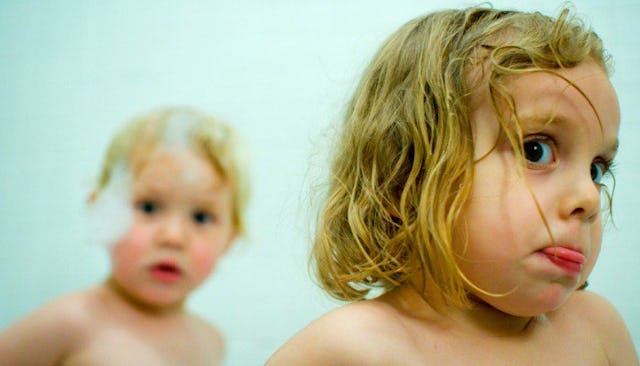5 Reasons Why I Talk To My Young Kids About Sex And Sexuality

One of the trickiest topics to discuss with children ever is sex and sexuality. They start learning about themselves and the world around them at a young age, and my husband and I want our little ones to be prepared, which is why we’re open about these types of things. There are five big reasons that we talk to our little ones about all things sex:
1. We don’t believe in body-shaming.
My son has a penis. My daughter has a vagina. One day she’ll have breasts. That’s OK. It’s great even, because guess what? There’s nothing wrong with having sexual organs. In fact, it’s part of being a human being. If my son walks in while I’m going to the bathroom, I don’t freak out. If he has a question about my body, I answer it. I’m not ashamed of being a woman, and my son shouldn’t feel uncomfortable about it either. While privacy is important, we make it clear that—male or female—there’s nothing yucky about the human form. There’s no shame in feeling the feels that are a part of the human experience.
Because of this, my now 6-year-old knows that his room is his private space, and he’s got free reign over his body parts in there. His father and I don’t try to regulate how he feels about his own body—that’s his own domain. We don’t want our kids to feel weird about who they are or the body parts they’ve got.
2. We don’t believe that kids should be led to misunderstand their own bodies.
Too many people call the penis a “wee-wee” and the vagina a “hoo-ha.” Why are we afraid of these words, and why shouldn’t our children know what their body parts are called? As adults, we tend to sexualize body parts based on our own grown-up perspective, but kids don’t see it that way—nor should they. A penis is just another body part, like a nose or an arm. Giving it a funky name makes it taboo, which it shouldn’t be. We want our kiddos to know who they are and what they’ve got, and we don’t think that will happen if we discuss their genitalia as if it’s a mythical creature like a Heffalump or Woozle.
3. We believe that kids do well with honesty.
If you can imagine this, I had a co-worker once who demonized sexuality so much she insisted that she would use the words “chicken” and “bird” to describe the male and female genitalia with her kids as her mother did with her when she was a child. (I can’t remember which one was attributed to which gender; I was in shock.) It would be an understatement to say that I was horrified by her admission. While I believe that it’s important that we respect one another’s parenting choices, this particular one felt wrong to me. Just like adults, children have the right to information including knowledge about their own bodies and how they work. Furthermore, when that kid starts learning about farm animals, won’t he get confused? I would.
If you can imagine it, my 6-year-old knows where babies come from—in a non-sexual way that makes sense for his age and maturity level. My little science nerd is very comfortable with terms like “sperm” and “placenta,” and as we continue to grow our family, he loves that he can discuss the specifics with us. It’s empowering for him.
4. We know that knowledge is power.
We see our little ones as boys and as girls, but never as sexual beings. Yes, when changing my 2-month-old son’s diaper first thing in the morning, seeing an erection scared the absolute shit out of me. Didn’t I have another 12 years or so to prepare for him to get hormonal? Unfortunately for me, the kid was all man from the day he was born, and that means his body sometimes does the talking for him.
Sexual abuse is an epidemic all over the world. Kids need to know what’s what, because they are people, and we’re not doing them any favors by confusing them about their own bodies. They need the knowledge and the language to talk about how they feel and what they are experiencing. Giving them knowledge is the best way that we, as adults, can keep them safe.
5. We want our kids to talk to us.
When we give them the information they need, they’ll know they can talk to us. Our kids know they can feel safe discussing everything from what’s appropriate and what’s not to their own feelings about sex and sexuality. Our kids are who they are, and we’ll love them no matter what.
There are probably a million more reasons to talk to your kids about sex and sexuality. Bottom line is that I want my kids to be educated, and I want them to be smart about everything—from what they’ve got on their bodies to where babies come from. The only way I, as a parent, can make that happen is to be open with them. We lie to our kids about a lot of things like Santa Claus or what will really happen if they don’t buckle their seat belts. Sex, however, is one thing I will always talk about with my kids honestly.
This article was originally published on